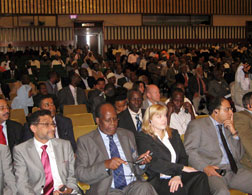 Avant qu'une autre journaliste de la trempe de Emily Meehan, commence à ironiser sur Djibouti comme sur le processus de la Somalie (Jan. 30, 2009) : "" Would You Like To Be President of Somalia?
Avant qu'une autre journaliste de la trempe de Emily Meehan, commence à ironiser sur Djibouti comme sur le processus de la Somalie (Jan. 30, 2009) : "" Would You Like To Be President of Somalia?If so, send a résumé, photo, and $2,000 to a hotel in Djibouti.
An electoral committee of Somali parliamentarians is examining the résumés and photographs of a dozen or so candidates who applied to become president of Somalia. The election is scheduled for Friday, Jan. 30, and many of the résumés arrived on Jan. 29. Being a citizen of a foreign country is no problem. The only prerequisite is an application fee of $2,000. There is not enough time for background checks, since the new president, whoever he may be, is expected at this weekend's African Union summit in Addis Ababa, Ethiopia.
So, it seems that nobody cares about democracy for Somalia, except the people who are currently stuck there having their hands cut off for theft, being kidnapped for ransom by their own government officials, dying of malnutrition in camps for "internally displaced persons," paying off teenage gunmen at roadblocks, being shot for watching movies, or getting stoned to death for the sin of being raped. ""
AFP - OUAGADOUGOU — Quatre candidats d'opposition ont rejeté mardi par avance les résultats de la présidentielle de dimanche au Burkina Faso, affirmant que de "graves irrégularités" avaient entaché ce scrutin dont Blaise Compaoré, au pouvoir depuis 1987, était le grand favori.
"Nous, candidats de l'opposition, (...) rejetons tout résultat, aussi provisoire soit-il, qui sera prononcé" par la commission électorale "actuelle à l'issue du premier tour du scrutin présidentiel du 21 novembre 2010", indiquent dans une déclaration lue à Ouagadougou les candidats Bénéwendé Stanislas Sankara, Hama Arba Diallo, Boukari Kaboré et François Ouampoussogo Kaboré.
De "graves irrégularités" à travers le pays "entachent sérieusement la crédibilité et la régularité du scrutin", affirment-ils, réclamant "la reprise effective" de l'élection "dans des conditions régulières".
Parmi ces "irrégularités", qui s'ajoutent selon eux à "la non-légalité des cartes d'électeur", ils citent l'"existence de listes parallèles d'électeurs", des "votes multiples" de certaines personnes ou la "rétention intentionnelle" de cartes d'identité dans des "fiefs de l'opposition".




































0 <<< VOS COMMENTAIRES:
VOS COMMENTAIRES